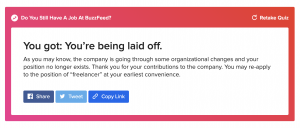
By Bex Peterson, Editor-in-Chief
It was a grim week to be an aspiring journalist on Twitter.
It seemed like nearly all the writers I follow were laid off or knew someone who was laid off. Aside from the great BuzzFeed purge there have also been layoffs at several other media outlets such as the Huffington Post and Into (a queer-centred digital magazine launched by Grindr which was shut down two weeks ago). Colleagues on Twitter and in my Facebook groups posted message after message saying they were out of work and searching for freelance gigs. As someone with hopes to more fully immerse myself in journalism and content creation once my days with the Other Press are over, it’s been a bitter taste of what my future might hold.
The circumstances of these layoffs are questionable to say the least. BuzzFeed in particular has been hit with criticism after deciding not to pay out laid-off employees accrued paid time off (PTO), a practice that is so standard as to be expected in cases of lay-offs (and is required by law in California). BuzzFeed is not a unionized company; in fact, chief exec Jonah Peretti discouraged his employees from forming a union by allegedly telling employees that he’s “not anti-union […] but doesn’t think unionization is right for BuzzFeed.”
Unions are becoming something of a rare concept these days, as is job security. A lot of our workforce is falling into the “gig economy” category, especially among younger people looking to subsidize their more traditional paycheques with flexible work. There’s no healthcare plan for your SkipTheDishes delivery driver, no retirement package for the freelance writer sending pitches off to any online publication that will take their piece. It works out well for the people at the top of the pyramid—all the benefits of a workforce, without having to pay out benefits.
Forming a union these days is tough. Amazon has become virtually synonymous with the concept of union-busting, as have some of the more Silicon Valley-style companies that have risen up over the years. Organized action is a scary thought to people who currently hold all the power. People have credited Nancy Pelosi’s pressuring of Donald Trump for ending the disastrous US government shutdown this past month, but it’s likely that the organized “sickouts” and threats of strike action from overworked and unpaid aviation workers had a large impact on the administration’s decision as well, if not more so.
It’s not always easy to promote organized action in the workplace. Things like collective bargaining and union regulations tend to make the higher-ups twitchy, and nervous CEOs tend to fire people. But if these layoffs have taught us anything, it’s that the importance of a union can’t be understated. The more we call for unionization, the safer unionizing will be for all of us.
Until next issue,
Bex Peterson



